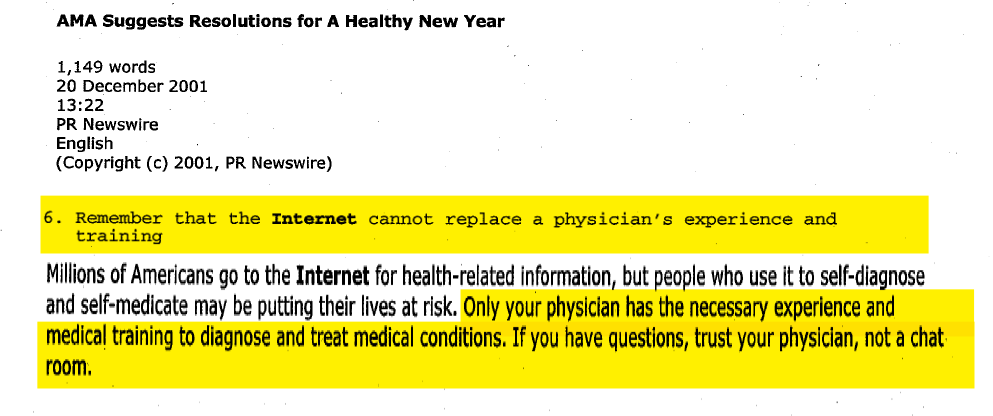Bowing to popular demand (OK, one person) I uploaded a PDF of the 2001 press release from the American Medical Association which suggested that Americans make a New Year’s resolution to “trust your physician, not a chat room” since the information found online puts “lives at risk.”
I distinctly remember seeing those words flash across my screen and knowing that I had to have my own copy of this artifact (much in the same way I printed out screenshots of early websites in 1994 — sadly, not capturing the good old blink that punctuated so many pages).
I incorporated the AMA release into my remarks at Health 2.0 as an example of an organization that was slow to adapt to the new realities of the information marketplace, hoping to inspire the VCs, pharma execs, advocates, and other health dot-com players in the audience to question their own assumptions, even as they forge ahead with cutting-edge solutions. I very much welcome debate — it’s why I gave the speech and contribute to this blog. But please also read my reports, since that’s where my real source material resides.







I vividly remember the many remarks (from 1995 to early 2000) about the grave dangers our users were facing due to the bad information they obviously got from other malinformed online patients.
Then at the beginning of the new millennium the tone started to change and doctors started to understand the benefits of informed patients.
In 2008 the vast majority of doctors still do not understand the depth of the information generated by well organized large online communities.
I can only tell you that one of the ACOR groups know more about all the possible side effects of 3 recently approved antiangiogenic than almost any of their treating physicians. When 1,500 patients relate their side effects you get a lot of information that a single physician could never have access to, unless he has an extremely active and extremely specialized practice. That doesn’t represent the majority of clinical oncologists.
And so, the schism still exists. Until we can educate doctors about the benefits of participatory medicine many will just miss this incredible opportunity to advance science, medicine and improve the healthcare system while promoting a necessary democratization of the flow of medical knowledge.
Excellent point re “recently approved,” Gilles. This is so important.
Effective e-patients are not clueless idiots, they’re responsible partners in a participatory medicine relationship. I’m sure the AMA didn’t have that in mind 7 years ago. But now, consider:
1. The rate of change makes it absolutely physically impossible for anyone to keep up with everything. I went through this in my career as a product manager – the story is in a comment on Paul Levy’s blog re “Democratization 2.0” http://runningahospital.blogspot.com/2008/03/democratization-20.html. People who didn’t get it went out of business, as technologies arose to let people agilely leverage the latest information, even week to week.
2. Patients and their families have time and motivation to go deep (very deep) on any subject, far beyond the capacity of good doctors who must treat many conditions every day.
3. When you read that your median survival time is 5.5 months, you don’t sit back and ponder, and your doctor doesn’t have time to register for a seminar next year. You ask peers “What the %$#@ do I do NOW??” And they say, “Well, I just happen to have been reading my a$$ off about that.”
4. During my illness, ALL of the misleading information I found about my kidney cancer came from well respected web health resources. Why? Because ALL of the well-vetted peer-reviewed data was gathered before any of today’s treatments existed. (See #1.) (And that was before any of the new angiogenesis drugs, so the situation just got worse.)
5. After discussion with *my* peers on ACOR, at a conference a leading doctor presented good solid peer-reviewed data, which was ten years old. I asked: “But none of these studies are relevant for predicting MY outcome, today, right?” and he agreed. I laud his integrity!
The irony is that patients stay clueless (as the AMA feared) when they do NOT participate, so keeping them on the outside kept that condition in place. (Imagine my being able to do #5 in that old world, pre-ACOR.) No more.
Popular demand has increased to two people! Ted Eytan wrote this interesting response on his blog:
http://www.tedeytan.com/2008/03/13/298
As someone who just got over sinusitis (using home remedies, not antibiotics, after discussing with my doc) I am esp. intrigued by Ted’s mention of the JAMA article, “Antibiotics and Topical Nasal Steroid for Treatment of Acute Maxillary Sinusitis.”